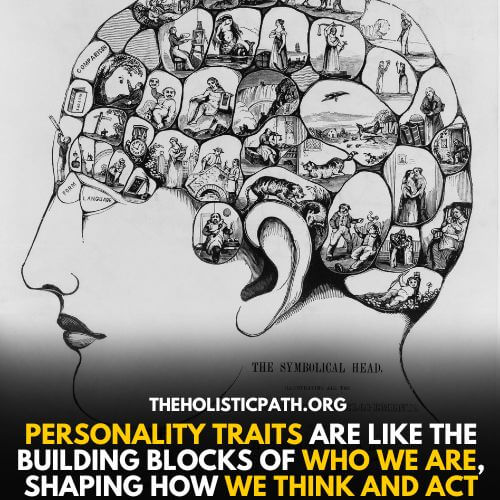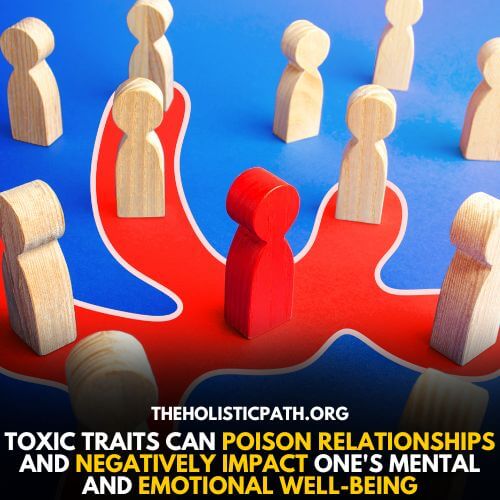Ever spent time with someone who seemed friendly, only to leave you feeling insecure and emotionally drained later? Such encounters often signal the presence of toxic personality traits. Beyond personal relationships, these toxic behaviors can permeate professional environments, contributing to issues like the Great Resignation.
Recognizing these toxic traits early on is crucial, not only for your well-being but for maintaining a healthy professional environment. Despite the label, toxic traits aren’t really traits at all. Let’s delve into what makes these behaviors toxic and how being aware of them can make a significant difference.
What Are Toxic Traits?
35 Examples of Toxic Traits
Toxic traits are behaviors that can be harmful to oneself and others in relationships, and they aren’t always obvious; they can be very subtle and challenging to recognize when encountered. Here are some examples:
- Manipulation: This involves using cunning tactics to control or influence others for personal gain. It can include emotional manipulation, guilt-tripping, or gaslighting, where an individual undermines another’s perception of reality.
- Narcissism: People with narcissistic traits think very highly of themselves, care less about others’ feelings, and always want others to admire them. They might use others to get what they want, not caring about how it affects those around them.
- Controlling Behavior: Those who are controlling want to boss others around and make all the decisions. It comes from a desire for power and a fear of losing control, which can make relationships feel one-sided and unhealthy.
- Jealousy and Envy: Constant feelings of jealousy and envy can lead to toxic behaviors such as undermining others, spreading rumors, or actively working to sabotage others’ success. This can create a competitive and toxic atmosphere.
- Insecurity: Chronic insecurity can show up as a constant need for reassurance, fear of being abandoned, or difficulty trusting others. It can make relationships challenging, especially when someone constantly seeks validation.
- Lack of Accountability: Individuals who refuse to take responsibility for their actions and instead blame others for their problems create a toxic environment. This behavior hinders personal growth and damages relationships by avoiding accountability.
- Dishonesty: Always lying or being deceitful destroys trust in relationships. It erodes the foundation of open communication and can even break relationships apart.
- Negative Attitude: Constant negativity, complaining, and a pessimistic outlook can create a toxic atmosphere. It can bring down the mood of a group and make it difficult for others to maintain a positive mindset, impacting overall well-being.
- Intolerance: Intolerant individuals may display discriminatory or prejudiced behavior, making it difficult for those around them to feel accepted and valued. This can create a hostile environment.
- Emotional Unavailability: People who are emotionally unavailable may struggle to connect with others on a deeper level, creating a sense of distance and isolation in relationships. It can lead to a lack of emotional support and intimacy.
- Arrogance: Arrogant individuals have an inflated sense of their own importance and may belittle or dismiss others, creating a hierarchical and unhealthy dynamic.
- Competitiveness: While healthy competition can be positive, excessive competitiveness to the point of undermining others can be toxic. It may result in a hostile environment rather than fostering collaboration.
- A Lack of Self-awareness: When someone lacks self-awareness, they struggle to understand their own emotions, behaviors, and impact on others. This can lead to challenges in personal growth and strained relationships, as they may not recognize the need for change or improvement.
- Victim Playing: Individuals who frequently play the victim may avoid taking responsibility for their actions and manipulate others through a sense of sympathy. This can create a cycle of blame and emotional turmoil.
- Attention-Seeking: Constantly seeking attention and needing to be the center of focus in social situations can be draining for those around them, as it may lead to a lack of balance and consideration in relationships.
- Indecisiveness: When someone struggles to make decisions, especially in group settings, it can slow down progress and create frustration. In situations where quick decisions are needed, chronic indecisiveness can hinder the group’s ability to move forward and achieve its goals.
- Passive-Aggressiveness: Instead of openly expressing their anger or frustration, a passive-aggressive person may resort to subtle, negative behaviors. This indirect approach makes it challenging to address issues directly, leading to unresolved conflicts and strained relationships.
- Withholding Information: Deliberately keeping important information from others creates an atmosphere of mistrust. In a collaborative environment, this can hinder effective communication, leading to misunderstandings and difficulties in working together.
- Gossiping: Engaging in gossip, talking negatively about others behind their backs, damages relationships and erodes trust within a group. It creates a culture of negativity that can be harmful to the overall well-being of the community.
- Stubbornness/Inflexibility: A refusal to adapt or compromise, even when necessary for the well-being of relationships or group dynamics, can result in stagnation. Inflexibility impedes progress and can lead to frustration among team members.
- Perfectionism: Setting unrealistically high standards for oneself and others can lead to constant dissatisfaction and stress. It creates an environment where mistakes are not tolerated, impacting overall well-being and hindering creativity.
- Dependency: Over-relying on others for emotional support or decision-making creates an imbalanced dynamic in relationships. This dependency can strain connections, limiting personal growth for both parties.
- Chronic Complaining: Habitually expressing dissatisfaction without actively seeking solutions can bring down the morale of those around. It fosters a negative environment, making it difficult for individuals to maintain a positive mindset and collaborate effectively.
- Defensive Behavior: Responding defensively to constructive criticism creates a barrier to open communication. This defensiveness hinders personal and professional growth, preventing individuals from learning and improving.
- Criticizing Others: Constantly finding faults in others and vocalizing negative judgments creates a hostile and judgmental environment. It erodes trust, damages relationships, and can lead to a breakdown in collaboration.
- Impulsivity: Acting without considering the consequences can lead to erratic and harmful behavior. It may strain relationships and hinder the achievement of personal and group goals.
- Avoidance of Responsibility: Refusing to take responsibility for one’s actions or their impact on others creates a culture of blame. It damages relationships and inhibits personal growth by avoiding accountability.
- Sarcasm: Using sarcasm as a default mode of communication can be hurtful and undermine genuine connection. It may lead to misunderstandings and strained relationships, as the intended tone is often lost.
- Exaggeration: Habitually inflating or distorting facts to make situations seem worse or more dramatic than they are can create unnecessary tension and miscommunication. It erodes trust by presenting an inaccurate representation of reality.
- Over-Competitiveness: Taking competition to an extreme, constantly trying to outdo others without regard for their feelings or well-being, can create a cutthroat environment. It may damage relationships and hinder collaborative efforts.
- Inability to Accept Criticism: Reacting negatively or defensively to any form of criticism hinders personal and professional growth. It creates a barrier to constructive feedback and improvement, limiting the individual’s potential.
- Boundary Violation: Disregarding personal boundaries and invading the personal space or privacy of others can lead to discomfort and strained relationships. Respecting personal boundaries is crucial for maintaining healthy connections.
- Conflict Avoidance: Individuals who avoid conflict often refrain from addressing issues or expressing their needs to maintain a superficial sense of harmony. While conflict avoidance may seem peaceful, it can lead to unresolved issues, resentment, and the deterioration of relationships over time.
- Disregard for Others’ Time: Consistently being late or failing to respect others’ time commitments shows a lack of consideration. It can strain relationships and hinder effective collaboration, as punctuality is an essential aspect of mutual respect.
- Laziness: Laziness refers to a consistent lack of motivation or effort in carrying out tasks. It can hinder personal and professional success, create tension in relationships, and lead to a sense of unfair burden on others.

8 Common Myths About Toxic Traits
We often get some things wrong about toxic behaviors, and it’s really important to get it right. When we understand toxic traits better, we can have happier and healthier relationships, both at home and at work.
| Myth | Reality |
|---|---|
| Toxic Traits are Always Evident and Easily Identifiable | Toxic behaviors can be subtle and not immediately apparent. Long-term patterns should be considered. |
| Toxic Traits are Inherent and Unchangeable | Individuals can learn and grow; with self-awareness and commitment, toxic traits can be changed. |
| Only Extremely Negative People Display Toxic Traits | Toxic behaviors can stem from various sources, including insecurities and learned coping mechanisms. |
| Toxic Traits Only Affect the Person Displaying Them | Toxic traits have a ripple effect, impacting relationships, teams, and communities. |
| Toxic Traits Are Always Intentional | Not all toxic behaviors are deliberate; some individuals may not be fully aware of the impact on others. |
| Confronting Toxic Traits Always Leads to Resolution | Confrontations may not always lead to positive outcomes; change may take time or may not occur at all. |
| Toxic Traits Are Limited to Personal Relationships | Toxic behaviors can manifest in various settings, including professional environments. |
| Ignoring Toxic Traits Will Make Them Go Away | Ignoring toxic behaviors allows them to persist and potentially escalate; addressing them is crucial. |
7 Signs of Toxic Traits
Toxic traits can poison relationships and negatively impact one’s mental and emotional well-being. Just like unhealthy habits harm our bodies, certain actions in people can harm the connections we share. There are some behaviors that act as warning signs for toxicity. These include:

1. Gaslighting
Gaslighting is like playing mind tricks to make you doubt what you know. Toxic people use it by changing facts, denying things they’ve done, and making you feel like you’re too sensitive or confused. This behavior can really mess with your self-confidence, leaving you feeling unsure.
Those who play these mind games often don’t care about your feelings and want to avoid taking responsibility. It’s important to notice these tricks, understand how toxic people in your life work, and set clear rules to keep yourself safe.
2. Playing the Victim
Some people act like everything bad always happens to them – we call this playing the victim. It creates a lot of stress in relationships because they avoid trying new things and taking responsibility for their actions.
It’s like they’re stuck always feeling sorry for themselves.
Setting clear rules is really important when dealing with friends or partners who act this way. Breaking free from this victim thinking is essential for having healthier and more balanced connections.
3. Refusal to Apologize
In healthy relationships, saying sorry is a part of growing. But some toxic people find it hard because they think they’re better than others.
This can lead to a lot of lying and make relationships feel bad.
Recognizing and dealing with this toxic trait is important for having a relationship where both people respect each other and can grow together.
4. Overprotective and Smothering Behavior
While it’s good for people to care about each other, toxic individuals can be too controlling. They want all the attention and control everything, making it hard for you to be yourself.
Recognizing these negative behaviors is important for keeping yourself well and finding a balance that lets you be independent in the relationship.
5. Draining Energy
Toxic people can be like energy vampires, always negative and needing attention. They might exaggerate things to get noticed, and being around them can make you feel really tired and unhappy. Recognizing this neediness is crucial for keeping positive in your life.
It’s important to set rules and, when needed, walk away from relationships that always make you feel tired and unhappy, so you can have a healthier and more positive life.
6. Walking on Eggshells
“Walking on eggshells” is a metaphor describing a situation where you feel extremely cautious and careful in your words and actions, as if any misstep could lead to conflict or negative consequences. In relationships, particularly with toxic individuals, this feeling often arises when you’re afraid of triggering anger, criticism, or other negative reactions.
It signifies an atmosphere of tension and unpredictability, where you’re constantly on guard to avoid setting off emotional explosions or confrontations. This state of heightened sensitivity can be emotionally draining and is indicative of an unhealthy dynamic within the relationship.
7. Hostile Communication
Toxic Traits: Men vs Women
It’s important to note that toxic traits are not exclusive to any gender, and individuals can exhibit toxic behavior regardless of whether they identify as men or women. Toxic traits are harmful behaviors or patterns that negatively impact relationships, well-being, and overall mental health. These traits can manifest differently in individuals, and it’s crucial to avoid generalizations based on gender.
That being said, some behaviors associated with toxic masculinity or toxic femininity stereotypes can be harmful.
It’s essential to recognize that these stereotypes are not universally applicable, and individuals may display a mix of traits regardless of gender. Here are some examples of toxic traits that can be associated with traditional gender expectations:
Toxic Traits in Men:
-
Emotional Suppression: Societal expectations may lead some men to suppress their emotions, which can result in difficulties expressing themselves and connecting with others.
-
Aggressiveness: Traditional notions of masculinity may promote aggressive behavior as a way to assert dominance. This can lead to conflict and harm in relationships.
-
Competitiveness: An excessive focus on competition and the need to be dominant can lead to a lack of cooperation and empathy in relationships.
-
Avoidance of Vulnerability: Some men may avoid showing vulnerability due to societal expectations, leading to difficulties in forming deep emotional connections.
-
Pressure to Conform to Stereotypes: Men may face societal pressure to conform to rigid gender roles, limiting their ability to express their individuality.
Toxic Traits in Women:
-
Passive Aggression: Societal expectations may pressure some women to suppress direct expression of anger, leading to passive-aggressive behavior.
-
Over-Accommodation: Women may feel compelled to prioritize the needs of others over their own, which can result in burnout and a lack of self-care.
-
Perfectionism: The pressure to conform to societal standards of beauty and behavior can contribute to perfectionism, leading to unrealistic expectations and stress.
-
Manipulation: Some women may resort to manipulative tactics in relationships as a means of control, which can be damaging and erode trust.
-
Fear of Assertion: Societal norms may discourage women from asserting themselves, leading to a reluctance to express opinions or desires.
It’s important to remember that these traits are not inherent to any gender, and individuals are unique in their behaviors. Additionally, societal expectations and norms are evolving, challenging traditional gender roles. Addressing toxic traits involves promoting healthy communication, and emotional intelligence, and fostering an environment where individuals feel free to express themselves authentically, irrespective of gender.
References:
WANDA THIBODEAUX. (OCT 24, 2018). Science Finally Explained What All Toxic People Have in Common. Here’s What It Means for Your Team. https://www.inc.com/wanda-thibodeaux/science-finally-explained-what-all-toxic-people-have-in-common-heres-what-it-means-for-your-team.html
Steven Melendy (August 04, 2021). Are You a Toxic Person? https://www.truity.com/blog/are-you-toxic-person
Malibongwe Tyilo (17 Aug 2021). Defining the toxic personality. https://www.dailymaverick.co.za/article/2021-08-17-defining-the-toxic-personality/

